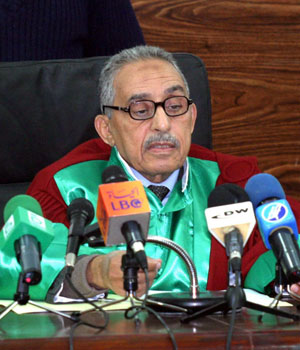
The presiding judge of Libya’s Supreme Court, Ali al-Alus, speaks during a hearing in Tripoli, 25 December 2005 (EPA)
TRIPOLI, (Reuters) – Libya”s Supreme Court on Sunday scrapped death sentences against five Bulgarian nurses and a Palestinian doctor and ordered a retrial of the cases which have harmed Tripoli””s efforts to build ties with the West.
The five nurses and the doctor, jailed since 1999 and convicted of infecting children with the HIV virus, will leave the death rows of their prisons to wait for retrial, an official said.
They had been sentenced to death by firing squad after a conviction which was condemned internationally and had undermined Libya””s attempts to reverse three decades of treatment as a rogue state by the West.
"The five nurses and the Palestinian doctor will not be considered as prisoners condemned to death after today”s ruling. They will become only defendants waiting for retrial," a court official, who did not want to be named, told Reuters.
The Supreme Court accepted appeals against a lower court ruling both on substance and procedure, their lawyers said. Its decision followed an agreement last week between Libya and Bulgaria to set up a fund to help families of the sick children.
The six medical workers had been convicted of infecting 426 Libyan children with the HIV virus in the Mediterranean port city of Benghazi. More than 50 of the children have died.
They said they were innocent and their confessions extracted under torture. AIDS experts have said the outbreak started before the nurses arrived and was probably caused by poor hygiene.
"The court has accepted the appeals by the nurses and the doctor and sends the cases back to the lower court for retrial," Ali Alouss, the Supreme Court presiding judge, told an appeals hearing.
Lawyers told Reuters that meant the death sentences were cancelled and the lower court in Benghazi which had earlier issued the sentences would retry the cases.
"The High Council of the Judiciary Authorities, the top judiciary authority, will decide when Benghazi”s lower court will retry the cases," the court official added.
He said the High Council procedure usually took two months before the lower court started a retrial.
A Bulgarian Foreign Ministry spokesman said Sofia hoped the retrial and the repeal of the death sentences were "a recognition of the serious procedural breaches in the trial".
But the relatives of the nurses reacted anxiously.
"I do not know what that ruling means. How can I rejoice? What””s the difference — death sentences, lifetime prison terms or other verdicts, when for seven years innocent people are in jail," said Tsvetanka Siropoulu, the sister-in-law of nurse Valentina Siropoulu.
RETRIAL DATE AFTER AGREEMENT
Families of the sick children gathered on a street near the court were angry and bitter.
"Today””s ruling delays further the final verdict on the cases and extends the suffering of the families. That verdict hurts their feelings as they see their children dying slowly," said Mohamed Salah, a father whose daughter is sick with HIV.
The Association of the Families of the HIV Infected Children””s chairman Ramdane Fitouri told Reuters the lower court could reconfirm the death sentences in the retrial.
"There is no doubt this prolongs our suffering but today””s ruling does not mean the death sentences could not be confirmed again by the lower court. The lower court has the authority to issue again the death sentences," he told Reuters.
But a Tripoli-based senior Western diplomat said he expected the nurses to return home early next year, based on a deal between the two governments.
He said the Libyan government would convince the families to pardon the nurses and the doctor based on the deal and the court would sentence them to life in jail.
"The Libyan government will then announce it has an agreement with Bulgaria to extradite prisoners to spend the prison terms at home and the nurses will fly home early next year," he added.
"What is certain to me is that the medical workers are going to eventually be released," said George Joffe, a North Africa expert at Britain””s Cambridge University. "But that will be a result of a political deal, " Joffe told Reuters.
An official of the Gaddafi Charity foundation, chaired by the influential son of Libyan leader Muammar Gaddafi, Saif al-Islam, has said that the Libyan and Bulgarian sides would meet on Wednesday to work out the financial details for the families of the children.
Tripoli had suggested the verdicts could be quashed if money were provided to cover financial compensation for the families of the victims and medical treatment for the children.
Libya had been dismissed as a pariah state by the west almost as soon as Gaddafi took power in 1969 promising to fight U.S. imperialism in the Middle East.
But Tripoli began turning around its relationship with the European Union and the United States in recent years, promising in 2003 to abandon attempts to acquire nuclear weapons and join the U.S. war on terror.
U.S. State Department spokesman Justin Higgins called the Supreme Court decision positive. "The international community is working with Libya to find an overall solution. As we have made clear before we believe a way should be found to allow the medics to return to Bulgaria and Palestine," he said.

Judge of Libya’s Supreme Court, Ali al-Alus (L) speaks during a hearing in Tripoli, 25 December 2005 (EPA)

File picture of Bulgarian medics at a court in Benghazi, Libya (REUTERS)
